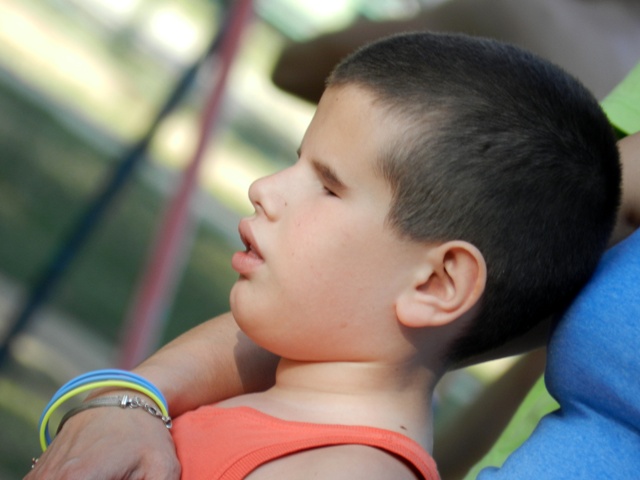Luka was born without eyeballs, and all of a sudden a whole new path was opened in front of us, full of endless questions and challenges
I have always wanted to have a brother or sister, so I constantly asked my mother why all my friends from kindergarten and school had someone, and I didn’t. In fall 2012, my dream finally came true. I got my brother Luka. We all knew the arrival of the baby in our family would change our lives, but we were not aware that it would turn them upside down.
Two hours after my mom had brought Luka into the world, the doctor called and told her, in a harsh way, about the defect my brother was born with. She opened his small eye sockets and asked my mother: “Have you seen this”?
From that moment on, my family’s struggle has started.

Luka was born without eyeballs, and all of a sudden a whole new path was opened in front of us, full of endless questions and challenges. I’m talking in the first person plural when I mention my parents and raising my brother, and this must seem strange to you. However, as a ten-year-old girl, I entered into a whole new world with them, realizing what was really important in life.
I also became aware of the fact that people and life can be cruel. I found out how patience and perseverance are essential for a child with special needs to have a nice childhood. This is especially true in a country like mine where awareness of the society about people with disabilities has not been built yet.
I cannot help but mention problem we have faced countless times; and not just my family, but also other families raising children with some form of disability: the doctors’ lack of interest, incompetence and general lack of willingness to tackle the problem and provide help and support that these children need in the earliest period of their lives.
There are lots of examples, but I will never forget the doctor who barely agreed, per my father’s request, to examine Luka, who was only a few days old. Then, how a mother should feel when she accidentally hears a doctor’s comment upon realisation that a child who does not see nor talk has been brought to him for an examination:
Out of all the doctors, why do I have to be the one who will examine this child?

There was too much finger-pointing, staring and comments. It took our neighbours a whole year to finally stop parking their cars in the parking space for the disabled in front of our building that was reserved for the car in which my dad took Luka every morning to kindergarten and back. People cannot understand, or simply do not want to understand, the type of obstacles families with children with disabilities face. And when you think you have passed them all, another one shows up, out of nowhere!
Luka was two years old when, apart from his vision problems, he went through a difficult period due to the teeth growth and stomach problems. He has just started making his first steps and calling us, when everything stopped. He kept crying and writhing. We were constantly holding him in our arms, singing and swaying him, trying to help him as much as we could. At one point, he had 8 teeth growing all at once. He stopped talking and walking. It took my mom a lot of time to get him back on his feet. She took him for a walk every day, even when it was rainy and snowy. Each step was followed by a scream and disapproval, but only thanks to my mother’s persistence and patience, Luka was able to walk on his own when he was five.
At that time, my parents tried to involve Luka to work with a defectologist, but due to everything that has happened, it has been estimated that he was not cooperative. We abandoned the idea of going to school for the blind and enrolled Luka in kindergarten which had a special group for children with different types of disabilities. He protested at first, but he soon became fond of going to the kindergarten. Thanks to his wonderful teachers he started to accept other children. Spending time in the kindergarten helped him socialize and behave in a better way.

This summer, Luka finished his first grade at the school for the blind in Belgrade, and I will write in one of my next blogs about the method of working with children with multiple disabilities, which has still not been adjusted to their needs and abilities. There are many children who, apart from the problems with eyesight, have some other disabilities, such as inability to speak, cerebral palsy, epilepsy, etc. This requires professional staff, modernization of curricula, and training of employees. Also, the institutions in our country should go hand in hand with, in this regard, similar institutions in developed countries and introduce programs that will provide training for children with multiple disabilities.
Raising a child with special needs is a great privilege, something that radically changes life and the way we look at the world. I’m happy to be Luka’s big sister who will always watch his back and, together with our little sister Kjara, look after him and guide him through life, trying to skip every obstacle that stands in our way. The biggest dream of our family is that Luka starts talking. Until then, if you hear: “Baba di!”, you will know that Luka is around!

















